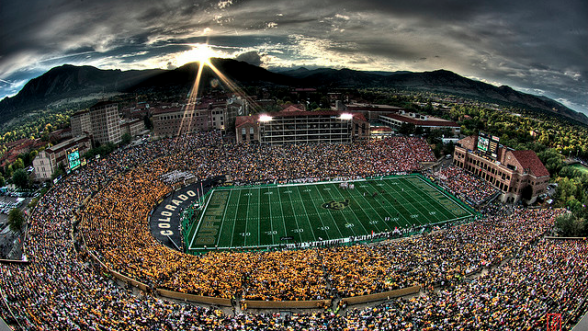
As colleges fight to draw fan interest while staying ahead of their conference competition, a new study from a professor at the CU Denver Business School examines college football conferences being structured based upon competition. The uncertainty-of-outcome hypothesis (UOH) suggests that sports fans value more competitive contests, suggesting that a competitive imbalance within a college conference will motivate the consistently successful teams to leave for greener pastures.
Over the past few decades, major college football fans across the country have been affected, both positively and negatively, by major shifts in conference structure. But why are these conferences constantly changing? Dr. Woody Eckard, Professor of Economics, researched this phenomenon.
With a study published in the Journal of Sports Economics, Dr. Eckard set out to examine why dominant college football teams voluntarily leave their conference to join a stronger one. The hypothesis would suggest teams “moving up” in conferences do so in order to keep the outcomes of their games more uncertain. Dr. Eckard then analyzed the schools that changed conferences to see if they were able to compete with their new conference competitors an equal level of competition.
Because college football has no regulations on how conferences can be established, the economic maximization of their programs becomes more complex than a simple counting of wins and losses. Football gives colleges a lift in brand recognition, increasing student enrollment and donations. Sold out stadiums bring in additional revenue from TV contracts and licensing. It makes sense that games garner more attention when the teams are more competitive with each other.
Eckard’s results generally support the UOH, a finding that has potential future impacts regarding recruitment and student athlete compensation. He also discovered that typically when a team moves to a new conference they experience a higher amount of uncertainty in the outcomes of games.
An economics expert with a penchant for sports
Dr. Eckard has performed economic research for 40 years, but has made inroads to sports economics research for the last 12 years. Specializing in microeconomics, market competition, and the regulation of markets, he overlapped his passion of sports to perform research at the Business School. Some of these sports research projects have covered topics regarding athlete graduation rate, coach salary investments, and the newly hot topic of college athlete payment structure.
Parity in collegiate athletic competition under the lens of the UOH is what Dr. Eckard set out to explore.
“There’s been a controversy among sports economists for a number of years regarding the extent to which athletic contests are attracting fans because of uncertainty in the outcome. This is a major attraction to fans that can impact the economics of college football.” – Dr. Woody Eckard
In conjunction with the College Sport Research Institute, Dr. Eckard supports interdisciplinary and inter-university collaborative college-sport research to serve as a research consortium for college-sport researchers across the United States.
College football’s economic outlook
With strong evidence that conference organization is used to increase competition in order to make football more uncertain and interesting, dominating a weak conference is becoming less attractive to colleges. Entering stronger conferences that produce higher levels of competition is becoming the focus of many athletic programs.
This study also has future implications on the level of investment that colleges consider making for their programs. High revenue athletic programs will be at the forefront of devising ways to make their teams more competitive.
How will this impact the future structure of college football conferences? Dr. Eckard will likely be keeping an eye on the conference realignment landscape to find out.


